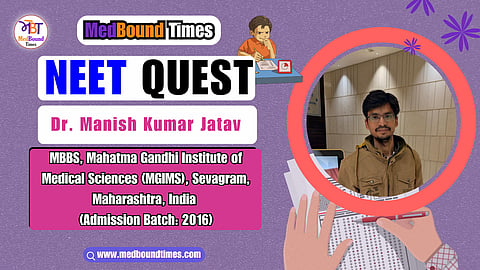NEETQuest - Dr. Manish Kumar Jatav
Name: Dr. Manish Kumar Jatav
Birth Place: Mandrayal, Karauli, Rajasthan
Academic Qualification: MBBS, from Mahatma Gandhi Institute of Medical Sciences (MGIMS), Sevagram, Maharashtra, India (Admission Year: 2016)
In which year did you qualify for NEET?
2016
Why did you choose this profession?
I wanted to become a scientist initially, but after seeing doctors and their work, I aspired of becoming one. When my family faced some illnesses, the desire to care for them deeply motivated me to pursue a career in medicine. Later, I realized that I genuinely enjoy helping people — that’s when I was completely sure that I wanted to become a doctor.
When did you actually start preparing for NEET?
2013
Did you take any coaching? Do you think coaching is necessary for clearing NEET?
Yes, but not necessary. Earlier a little bit of coaching was necessary for proper guidance — like what to study, where to study from, how to attend counseling after selection, which college would be good, etc. But nowadays, most of this information is available online.
How did you balance your school and NEET preparations? Was it the same, or did you study separately for NEET and the school examination?
I prepared separately for school examination and NEET-UG.
What were your sources during preparation for Biology, Physics, and Chemistry?
The source for Biology was NCERT book, but for Chemistry and Physics, the sources were handwritten notes from coaching centres.
Are NCERTs sufficient for cracking NEET? What's your opinion on this?
Earlier, NCERT was sufficient for Biology, but now some additional important knowledge and support is needed.
For Physics, notes can be from anywhere, but practice is what really matters.
For Chemistry, the study sources include NCERT, regular practice, and some extra important notes and tips, which are necessary.
What are the major challenges that you faced during preparation? And how did you tackle them?
Major challenge is staying focused and consistent. I tackled it by setting short term goals and tracking my progress. Remove distractions, using Pomodoro Technique, scheduling and following a timetable.
Is it true that when you prepare for this exam, you have to devote longer hours or burn the midnight oil? Did you have time to attend family functions or festivals, or were you always studying?
It’s not like I studied for long hours or skipped family functions and festivals. Everything has its own time — it's just that time management is important.
How did you keep yourself motivated during your entire journey?
Motivation isn’t constant. Small progress and daily discipline gave me confidence. I used to break big tasks into smaller ones, and finishing even a small goal kept me motivated. it’s consistency and self-discipline that matter most.
Did you use technology like social media or a phone during your preparation? How did you prevent yourself from Doomscrolling?
I didn't even have a phone.
Nowadays, coaching for NEET has started from an early age (even 6th or 8th grade). What is your opinion on this?
It's too intense or forced too early, it can lead to burnout, stress, and children missing out on a healthy, balanced school life.
What do you think is the right time to start preparation for NEET?
11th and 12th standard.
How many attempts should one take at this exam if one does not succeed?
If becoming a doctor is truly your dream, then give it a serious try by studying with full dedication at least once. But if you feel that you won’t be able to put in that kind of effort, then don’t attempt it just for the sake of it — try something else instead.
The cost of pursuing an MBBS degree from a private university in India is very high, and not everyone can afford it. What do you suggest someone do if unable to secure admission in a government institution? Should they take a gap year or seek admission abroad for the same course?
If you’re truly passionate about becoming a doctor and your NEET rank was close to the cut off, then taking a well-planned drop year is better than going abroad.
Your Mantra for success?
It’s consistency and self-discipline that matter the most.
What advice would you like to give to NEET aspirants?
Before anything else, be clear why you want to become a doctor. This clarity gives you the strength to stay disciplined during tough times.
What is your spiciest opinion that most people disagree with?
Toppers aren’t always the smartest students.
How would your parents describe what you do?
"Bas log usse sawaal poochhte hain, aur yeh unko mast jawab deta hai. Kabhi kabhi toh itna achha likhta hai ki lagta hai koi IAS officer bol raha ho."
"People just ask him questions, and he gives them amazing answers. Sometimes he responds so well, it feels like an IAS officer is speaking."
What do you hope the world will look like in 10 years?
Mental Health = Health.
I hope mental health is considered as important as general or physical health in future.
MSM/SE


